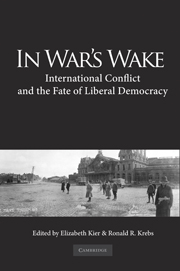Book contents
- Frontmatter
- Contents
- List of Contributors
- Acknowledgments
- 1 Introduction
- PART I WAR AND DEMOCRATIC TRANSITIONS: NEW AND DURABLE DEMOCRACIES?
- PART II WAR AND DEMOCRATIC PUBLICS: RESHAPING POLITICAL PARTICIPATION?
- 5 The Effects of War on Civil Society
- 6 Veterans, Human Rights, and the Transformation of European Democracy
- 7 War and Reform
- 8 Spinning Mars
- PART III WAR AND DEMOCRATIC STATES: GOVERNMENT BY THE PEOPLE OR OVER THE PEOPLE?
- References
- Index
5 - The Effects of War on Civil Society
Cross-National Evidence from World War II
Published online by Cambridge University Press: 05 June 2012
- Frontmatter
- Contents
- List of Contributors
- Acknowledgments
- 1 Introduction
- PART I WAR AND DEMOCRATIC TRANSITIONS: NEW AND DURABLE DEMOCRACIES?
- PART II WAR AND DEMOCRATIC PUBLICS: RESHAPING POLITICAL PARTICIPATION?
- 5 The Effects of War on Civil Society
- 6 Veterans, Human Rights, and the Transformation of European Democracy
- 7 War and Reform
- 8 Spinning Mars
- PART III WAR AND DEMOCRATIC STATES: GOVERNMENT BY THE PEOPLE OR OVER THE PEOPLE?
- References
- Index
Summary
Citizen participation in membership organizations, or civic engagement, is a crucial component of social capital, itself a key to an assortment of beneficial social outcomes, including economic growth, better political performance, more successful democratic consolidation, and even better health and longer life expectancy. These are undoubtedly important concerns for countries in times of peace, but they should be particularly pressing issues for societies seeking to recover from war. Precisely for this reason, recent international efforts at peace-building and reconstruction have devoted substantial resources to the strengthening of indigenous civil societies. But despite the importance of this question, few studies have considered, in a theoretically and empirically systematic fashion, the extent and manner in which war itself may have transformed civil society in post-conflict societies. Such an inquiry should yield important insights into how postwar civil societies may be rebuilt and/or fostered. This study attempts to take a step in that direction.
What impact does war have on levels of civic engagement? Existing studies of participation generally lead us to expect a fall in civic engagement in the wake of defeat and no fall, or perhaps even a rise, in the wake of victory. There are two main perspectives in this literature: socioeconomic and social-psychological.
Socioeconomic perspectives suggest that defeat is often accompanied by extensive physical destruction, economic weakness, and individuals' loss of income. Moreover, war, especially when prolonged, often interrupts young people's formal education.
- Type
- Chapter
- Information
- In War’s WakeInternational Conflict and the Fate of Liberal Democracy, pp. 97 - 120Publisher: Cambridge University PressPrint publication year: 2010
- 4
- Cited by



